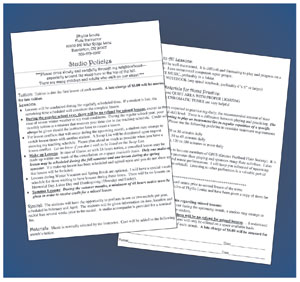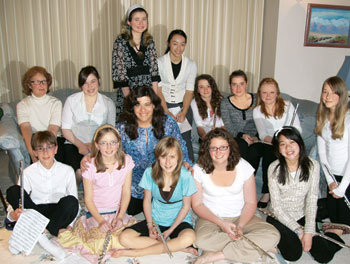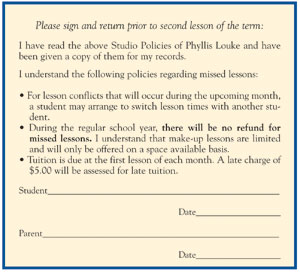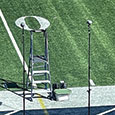Studio policies are an important business tool that keep a studio running smoothly. They are even valuable for teachers with just a few students. Written studio policies allow you to clearly and professionally communicate your expectations on topics such as attendance, payments, and practice time. Students and parents will take you more seriously when they have to sign a policy statement.
Developing a set of policies is like eating at a buffet: There are many items to choose from, depending on your preferences. My first set of policies was adapted from those of a colleague, but over the years I have added and modified the statements to clarify expectations and avoid misunderstandings and conflicts.

Lesson Rates and Due Dates
Most policy sheets begin with information about tuition and when it is due. They include rates for 30-, 45-, and 60-minute lessons. New teachers can determine the average rate in the area by talking to established teachers.
Once you have set the rates, there are various ways to structure the payment schedule.
1. Per lesson: Collect payment at the beginning of each lesson. This method makes it more difficult to collect for missed or cancelled lessons.
2. Per month: Collect payment in advance for the upcoming calendar month. Most months have four lessons but some will have five.
3. Per month: Multiply the number of lessons in the upcoming semester or year by the lesson rate, and divide by the number of months in the term to determine the monthly rate. This makes the monthly payment consistent, regardless of student vacation schedules or school holidays.
4. Per semester: Multiply the number of lessons in the upcoming semester by the lesson rate. Some teachers offer a discount for paying by the semester, while others offer an option to pay monthly with an additional surcharge.
5. Per year: Multiply the number of lessons scheduled for the calendar or school year by the lesson rate. Some teachers offer a discount to those who pay by the year, while others offer a monthly or quarterly payment plan with a surcharge.
6.“Baker’s Dozen” plan: Advance payment for 12 lessons earns one free lesson.
7. Occasional lessons: Many teachers levy a surcharge to the lesson rate for students who take less than weekly lessons.
I have set rates for 30-, 45-, and 60-minute lessons. Students pay for lessons monthly, depending on the number of scheduled lessons in the month. This makes it simple to detemine payments for students starting mid-month, when I cancel a lesson, or schedule a vacation day. For students taking less than four lessons per month, I levy a $5.00 per lesson surcharge.
Included in this section of your policies there should be a clear statement of due dates for tuition payments and whether fees are assessed for late payments. Some teachers bill their students as a reminder of tuition payment. Invoices can either be mailed or handed to students at their lessons. Tuition due dates will vary depending on the lesson rate chosen.
My Studio Policies state:
Tuition is due by the first lesson of each month. A late charge of $5.00 will be assessed for late tuition.
Collecting tuition payments can be stressful. Your studio policies make your expectations clear in advance. Just remember that you are running a business and shouldn’t be afraid to ask students for their tuition checks. Be direct: “Did your mom send a check with you today?” or “I need to get a check today for June tuition. The total is $120.”
I have not found it necessary to publish what the consequences are for non-payment. The $5 late fee seems to be deterrent enough.
Attendance
Studio policies should include information about missed lessons due to illness, schedule conflicts, school vacations, and any other attendance issues. Some options for addressing attendance might include:
1. There is no refund for missed lessons. [Clarify that the student’s tuition pays for the time slot in the teaching schedule, as well as for the lesson itself. Teachers still have monthly bills to pay regardless of whether a student attends their lesson.]
2. If a lesson is missed:
a. Credit will be given with 24 (or 48) hours notice in advance of the absence.
b. Credit will be given in case of illness.
c. Credit will be given in case of extended illness.
d. Make-up lesson will be offered at a mutually agreeable time. [It is best to put a time limit on scheduling the make-up lesson]
i. Within one week of the absence.
ii. Within one month of the absence.
e. A make-up lesson will be offered on a space-available basis. [If there is a cancellation during the teacher’s regular teaching schedule or during a time regularly set aside for make-up lessons]
i. Make-up lessons are limited to one make-up lesson per semester. [To avoid frequent cancellations, many teachers limit the number of make-up lessons allowed.]
3. When the instructor cancels a lesson:
a. A make-up lesson will be offered.
b. Credit will be given.
My Studio Policies state:
During the regular school year, there will be no refund for missed lessons, except in the case of severe winter weather or icy road conditions. During the regular school year, your monthly tuition is a retainer that reserves your time slot in the teaching schedule. Credit will always be given should the instructor have to cancel a lesson.
Make-up Lessons: In case of illness or with 24-hour notice, a cancelled lesson may be made up within one week of the cancellation on a space-available basis. Only one make-up lesson may be scheduled during the fall semester and one lesson during the spring semester. If a make-up lesson has been scheduled and agreed upon and you do not show up, that lesson will be forfeited.
For schedule conflicts, many teachers provide a swap list of other students’ scheduled times, so that students can arrange to exchange lesson times with each other. Upon request I distribute a swap list that shows my teaching schedule, and I encourage students to plan ahead as much as possible and to also inform me if they do not want to be listed on the swap list.
There are many options for scheduling conflicts that arise from school vacations. Many teachers’ schedules follow the school calendar, and they refrain from scheduling lessons during school vacations. Others may maintain a regular lesson schedule or operate a modified or compressed schedule that offers optional lessons during school vacations.
During the school year I cancel lessons on Labor Day, Thanksgiving Day, and Memorial Day, but not for the many teacher work days and other school holidays in our local school districts. During winter and spring breaks, I offer an optional lesson schedule that compresses my teaching into one or two days per week.
I also operate with a compressed schedule during the summer months, so that I have some time off. To give students more flexibility for last-minute vacations, I relax my cancellation policies.
Summer Lessons: During the summer months, a minimum of 48 hours notice must be given in order to receive credit for a missed lesson.
Promptness
Many teachers include promptness in their policies. In my studio, students are scheduled back-to-back to use my time most efficiently.
Lessons will be conducted during the regularly scheduled time. If a student is late, the remaining time scheduled will constitute the complete lesson.
Recitals
Information about recitals, such as specific dates, locations, and fees, can be included in studio policies. I include general information in my policies and send home more detailed information well in advance of the recital.
Students have the opportunity to perform in one or two recitals per year, usually scheduled in February and April. They receive specific information several weeks prior to the recital, and I provide a studio accompanist for a nominal fee.

Materials
Some policies include information about the syllabus or course of study. Because my students vary greatly in age (from 9 to 70) and ability (young beginners to advanced adults), information in my policy statement about materials is general. Some teachers give their students a list of music to purchase, while other teachers purchase music in advance and are reimbursed by the students. I have found it convenient to keep a small inventory of method books, etudes, and solos that I most commonly use with students. This makes materials available for immediate use, rather than having to wait a week or more for parents to obtain the materials from the local music store.
Music is normally selected by the instructor. Cost will be added to the following month’s tuition.
Policies spell out specific materials to bring to all flute lessons.
Please Bring to All Lessons:
•Flute: should be well-maintained. It is difficult and frustrating to play and progress on a flute with leaks. I can recommend competent repair people.
•All Current Music, preferably in a folder.
•Assignment Notebook (any spiral notebook, preferably 4”x 6” or larger)
Practice
Many policy statements spell out specific practice expectations.
Students are expected to practice regularly; the recommended amount of time depends on age and skill level. The key to success when learning to play an instrument lies in regular repetition of a specific detail. This is practice. Please use the following guideline to consider minimum requirements for this activity.
• Beginning Students: 20 to 30 minutes daily
• Intermediate Students: 30 to 45 minutes daily
• Advanced Students: 60, 120 to 180 minutes or more daily
Studio policies can also include information about practice space and recommended tools for students, such as a music stand, quiet area with proper lighting, and a metronome. A chromatic tuner is also helpful.
Enrichment
Studio policies are also a forum for recommending enrichment activities that will help your students become successful musicians. You can include information about the local flute club and recommend that students attend music performances, a valuable part of music education. Every month or two, I provide my students with a list of upcoming performances of the orchestra, band, and flute choir that I perform with, as well as information on events sponsored by our local flute club.
I encourage my students to become members of the Greater Portland Flute Society. It is a wonderful organization that promotes flute playing and sponsors many flute activities. I also encourage my students to attend music performances. I will keep you informed of upcoming musical events (especially flute-related). Attending performances is a valuable part of music education.

Signature
I require that each student, or parent of a student under age 18, sign my Studio Policies sheet (as shown below). This helps prevent misunderstandings about missed lessons and tuition payments. I provide a tear off sheet that reiterates that the signer has read the policies. I keep the signed portion, and the student keeps the detailed list of policies.
When developing your studio policies, it is helpful to look at the studio policies of other teachers. Contact colleagues in your area and ask them about their studio policies. Should you wish to see my full policies, they are posted on my website at http://phyllislouke.com.






